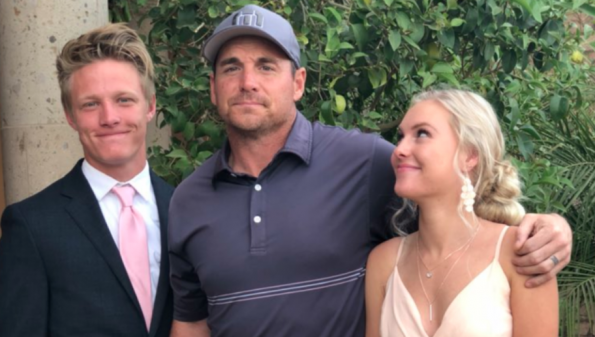
Apologies should mean something. If they don’t reflect an
inner change of heart, they aren’t genuine and most people can tell if you aren’t
serious. We’ve been accustomed to the forced apology since fights in grade
school got settled by teachers who wanted a quick end to the dust up. “Now say
you’re sorry” was part of the deal. Anything else meant getting kicked out or
suspended.
Celebrity apologies aren’t new but they’ve been taken to an
absurd level. We get ‘sorrys’ via the internet more frequently than rain in
spring time. The reasons are simple, a misconception exists that saying sorry
gets you back in everyone’s good graces. I can’t prove it, but I don’t think it
works that way. It’s frustrating to watch anyone beg forgiveness over something
they did publicly when a sorry isn’t warranted. It’s even tougher to hear (or
read) a forced apology from someone being coerced into saying it.
Jay Feely (former NFL player) recently apologized for
posting a picture (above) with his daughter and her date on their prom night. He is holding
a handgun (where is my fainting couch?) in the picture. The subtext of the
photo is clear “Don’t take advantage of my little girl dude”. I guess some people
were offended by the gun, and blasted him over it. He issued one of those weak
kneed ‘sorry if anyone took it the wrong way’ type apologies that are practically
cut and pasted from the last celebrity who wrote one.
This isn’t a real apology and he doesn’t have to give one.
The picture was set up in the way all prom night pictures are, dressed up kids
about to enjoy the night. He can’t be sorry for the photo, only the reaction to
it. He didn’t do it accidentally. He meant to post it and he meant for it to be
funny. Just because some people didn’t like it, he felt like an apology was due.
It wasn’t. If you don’t like something about a particular person, a half-hearted
apology won’t change your opinion of them. We know what a forced apology sounds
like. Kathy Griffin held a fake bloody Donald Trump head in a now infamous
magazine cover. She apologized because the backlash was so strong. But it was
as forced as Jay Feely’s. CNN dumped her immediately after the shoot. I can’t
imagine anyone who didn’t already like Griffin was moved by her teary apology spectacle.
As disrespectful as the cover was, she should have stood by it.
Both are examples of non-apologies of pictures that were
well planned. When Michael Richards (Krammer from Seinfeld) was videotaped
blasting a heckler with racist tinged language he was roundly criticized. I
thought his apology was genuine at the time because his reaction was something
done in a moment of anger. Also, he didn’t blame the heckler for his outburst
when he could have. He didn’t hedge. He still feels terrible about it. I
watched a Comedians in Cars Getting
Coffee episode where he talked to Jerry Seinfeld about the incident. The
event still bothers him. After all these years he is still saying how awful he
felt for grilling the man with racial epithets.
One way to tell if someone is really sorry is to read (or
listen) to the words they use. If the person talks about what they meant to say, or
how they mischaracterized, chances are someone is making them do it. Harvey
Weinstein famously talked about how ‘in his day’ or ‘I grew up in different era’
as explanations for his behavior. He opted for the explainer version, another way
of saying “Sorry I got caught”.
There’s an advantage to letting famous people do what they
do without remorse. It allows us to understand what type of person they are and
decide for ourselves whether to ignore them or not. Fake apologies allow true
scammers a pathway back to the mainstream. It allows companies who threatened
to pull sponsorship a way to check a box and forget the whole thing. Instead of
letting market forces drive demand, say bad TV ratings, Sponsors try to get in
front of the incident by insisting on an apology. We are supposed to believe
that companies are looking out for their bottom line and not wanting to lose
business over an angry public. But they aren’t worried about Joe Sixpack and
his opinion of some celebrity. They’re worried about activist groups bombarding
them with threats. Even small motivated groups can cause a real ruckus. Public opinion matters far less than group determination.
I do understand that famous people are held to different
standards (I didn’t say higher). Public access and public image is their
currency. But public apologies have been cheapened worse than a nineties sitcom
remake. I don’t know how much stock individuals puts in them. Corporations that
sponsor TV shows or run ads for upcoming films are supposedly the first
aggrieved parties. We are supposed to believe they are moved by public opinion.
But the same ones who get offended over gun pictures are likely same ones
putting pressure on companies to pull support because of an incident. How big a group is this exactly?
Something tells me it is small but noisy.
Here’s a prescription for future apologies; if you’ve done
something egregious whether in the heat of the moment or after further
consideration, by all means say you made a mistake and mean it. If you do
something that you don’t feel is wrong but ‘offends’ a lot of people, don’t
apologize. Nothing is worse than a glib ‘if anyone was offended’ Twitter
message. We aren’t buying it.
No comments:
Post a Comment